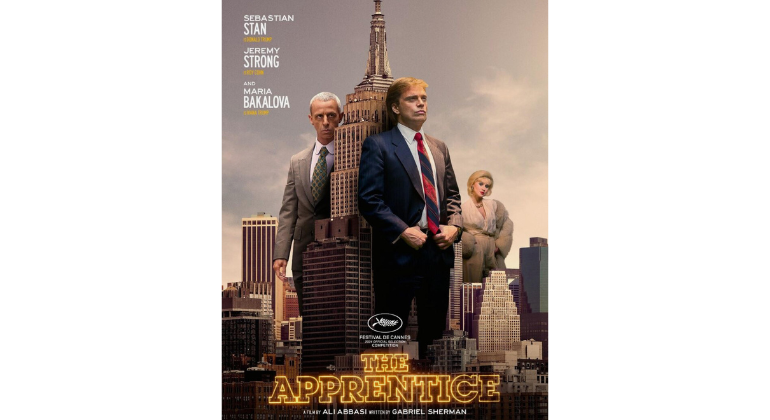
The Apprentice: A critical analysis of Trump, power, and its potential election impact
With less than 30 days until the U.S. presidential election, the release of The Apprentice, a controversial new movie about Donald Trump, has arrived at a critical moment. Directed by Ali Abbasi, the film offers a strikingly nuanced portrayal of the future 45th president, depicting him not only as a rapist, liar, and untrustworthy businessman but also as a tragic figure shaped by his environment. The timing of the release—on 1,700 screens across the country—raises significant questions about its potential impact on a campaign that may be decided by a razor-thin margin in key battleground states.
The film’s most shocking and divisive moment is a graphic depiction of a marital rape involving Trump’s first wife, Ivana, which she testified about during their divorce proceedings. Abbasi’s decision to include this wrenching scene is intended to show the public how attitudes around marital assault were viewed at the time. For Trump supporters, this scene will undoubtedly inflame anger and outrage, while for those on the fence, it could prove pivotal in shaping opinions of the candidate’s character as election day nears.
The Apprentice does not follow the typical anti-Trump narrative. Instead of casting him as a singularly wicked figure, Abbasi’s film explores Trump’s rise as a product of his circumstances. Set in the backdrop of “bad-old-days” Manhattan, the film shows Trump as an ambitious developer influenced by his loveless family and his ruthless political mentor, Roy Cohn. These relationships and his early business dealings molded him into the figure who would later dominate American politics. In this regard, The Apprentice isn’t just about Trump; it’s also about the environment that enabled his rise to power.
While much of the film paints Trump as a deeply flawed figure, it also shows moments of humanity. Sebastian Stan’s portrayal of young Trump is surprisingly sympathetic at times. We see him as insecure, yet ambitious, with dreams of transforming New York’s skyline when others doubted the city’s future. His early wooing of Ivana is even depicted as endearing. It’s as if Abbasi draws a parallel between Trump and the fall of a hero in a Greek tragedy, showing how a driven man lost his way through a series of moral compromises.
However, The Apprentice does not absolve Trump of his actions. By the end of the movie, we see a figure who has betrayed nearly everyone in his life—business associates, family members, and even his own principles. Abbasi explores how Trump’s story reflects broader flaws in American society. Trump’s rise is depicted as part of a larger system of greed, social Darwinism, and media complicity, rather than as a unique aberration. In Abbasi’s view, Trump is not a one-off phenomenon but a product of power structures that have been in place for decades.
This framing makes The Apprentice particularly relevant in the current election cycle. The film suggests that Trump’s rise to power was not just due to his ambition but also to the media’s role in elevating him. Abbasi pointedly critiques how outlets that now condemn Trump once profited from his larger-than-life persona. In this sense, The Apprentice is not only a political film but also a reflection on the media’s responsibility in creating the figures it ultimately tries to dismantle.
While The Apprentice garnered an eight-minute standing ovation at Cannes, it faced numerous hurdles in its U.S. release. The film struggled to find a U.S. distributor and even had to launch a Kickstarter campaign to secure more screenings. Major networks like ABC and CBS rejected TV spots for the film during the presidential debates, likely fearing the backlash from Trump’s loyal base. Even the film’s Washington premiere was low-key, held in a small brewhouse rather than a high-profile venue.
The release of a film with such provocative content at this point in the election cycle could have real consequences. With the race between Trump and his challengers already bitterly polarized, The Apprentice may embolden Trump’s most loyal supporters while pushing undecided or moderate voters to reconsider their stance. In an election that could be decided by a few thousand votes in swing states, the movie’s depiction of Trump as a morally compromised figure may tip the balance.
At its core, The Apprentice offers a complex portrayal of Trump’s rise, but it also prompts a deeper reflection on American politics, media, and power. As Abbasi provocatively suggests, Trump’s story is not unique—he is a product of a flawed system that thrives on greed, ambition, and media manipulation. In this light, the movie’s tagline, “An American Horror Story,” takes on new meaning. Abbasi challenges viewers to see that if Trump is a monster, then there is a monster lurking within the systems that created him—and perhaps, within all of us.
For voters watching the election unfold, The Apprentice is more than just a story about Trump—it’s a reminder of how power, media, and ambition can collide to shape not only one man’s life but the future of an entire nation.